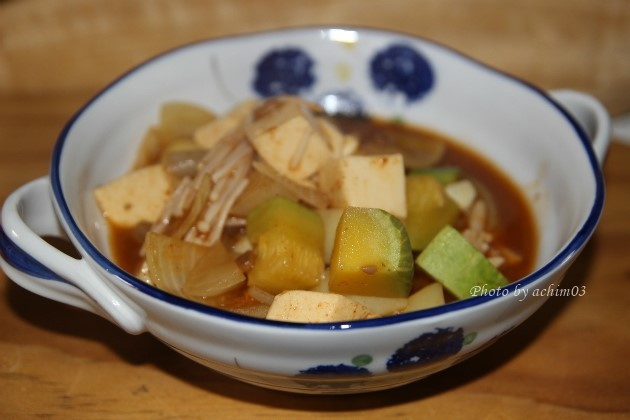Spicy Gochujang Stew (Gochujang Jjigae)
Clean Out the Fridge! Deliciously Spicy Gochujang Stew

Gochujang Jjigae is a stew that we find ourselves making just as often as Doenjang Jjigae! This is the first time I’ve made it in a while. Honestly, I made it on a day when it was raining cats and dogs, and since I couldn’t go grocery shopping, I used up what I had in the fridge! It’s a flavorful, slightly spicy stew that’s perfect for a comforting meal.
Main Ingredients- 2 small potatoes
- 1/3 Korean zucchini (aehobak)
- 1/2 onion
- 1 block (small) firm tofu
- 1/2 pack enoki mushrooms
Seasoning & Broth- 2/3 Tbsp Doenjang (Korean soybean paste)
- 1 Tbsp Gochujang (Korean chili paste)
- 1/2 Tbsp dried shiitake mushroom powder
- 1/2 Tbsp dried anchovy powder
- 1/2 Tbsp minced garlic
- Plenty of rice water (or plain water)
- 2/3 Tbsp Doenjang (Korean soybean paste)
- 1 Tbsp Gochujang (Korean chili paste)
- 1/2 Tbsp dried shiitake mushroom powder
- 1/2 Tbsp dried anchovy powder
- 1/2 Tbsp minced garlic
- Plenty of rice water (or plain water)
Cooking Instructions
Step 1
First, peel the 2 potatoes and cut them into bite-sized cubes, slightly smaller than usual. Cutting the vegetables for the stew to a similar size ensures they cook evenly and makes for a visually appealing dish.

Step 2
Cut 1/3 of the Korean zucchini into similar sized pieces as the potatoes. If you slice it too thinly, it might break apart while simmering, so aim for a moderate thickness.

Step 3
Slice the 1/2 onion (either thinly or into cubes) and add it to the pot. Adding onions first and simmering them helps release their natural sweetness, enhancing the stew’s flavor profile.

Step 4
Add 2/3 Tbsp of Doenjang to the pot. Doenjang is a key source of saltiness, so adjust the amount according to your preference. I added a little as I enjoy its savory depth.

Step 5
Add 1 Tbsp of Gochujang for a spicy kick. You can adjust the amount of Gochujang based on how spicy you like your stew.

Step 6
Add 1/2 Tbsp of dried shiitake mushroom powder. This powder boosts the umami flavor, making the stew even more delicious.

Step 7
Also add 1/2 Tbsp of dried anchovy powder. Anchovy powder contributes a refreshing and deep savory taste. If you are using a pre-made anchovy-kelp broth, you can omit the shiitake and anchovy powders at this stage, as the broth will already have plenty of flavor.

Step 8
Now, pour in enough rice water (or plain water) to generously cover the ingredients. Using rice water makes the stew smoother and richer in flavor. If you don’t have rice water, plain water or anchovy broth is also fine. Bring the stew to a boil over high heat.

Step 9
Skim off any foam that rises to the surface while it boils for a clearer broth. Look at it bubbling away – it’s making me hungry!

Step 10
Once the potatoes are somewhat tender, cut the 1 block of firm tofu into cubes and add it to the pot. Add the tofu gently to prevent it from breaking apart.

Step 11
When the tofu starts to float to the surface, prepare the 1/2 pack of enoki mushrooms. Trim the base and separate the mushrooms into clumps, then add them to the pot. Once the enoki mushrooms are in, let it simmer for another moment, then turn off the heat immediately. Overcooking the enoki can make them mushy.

Step 12
Finally, stir in 1/2 Tbsp of minced garlic and mix well. And there you have it – a perfectly spicy and deeply flavorful Gochujang Jjigae! Even without pork, the combination of vegetables and seasonings creates a wonderfully tasty stew. Serve it hot with a bowl of rice for a truly satisfying meal!



